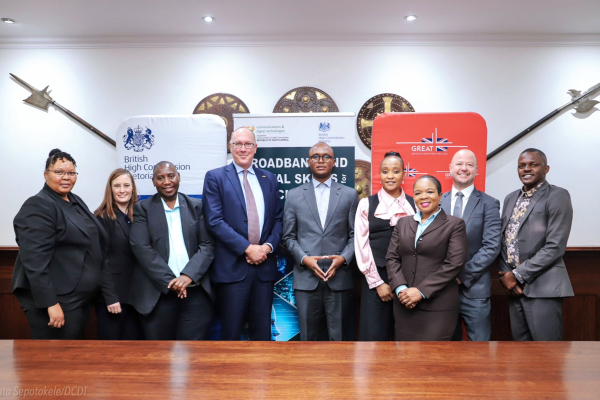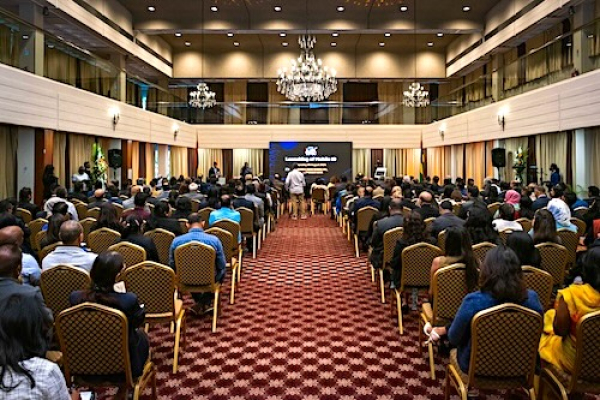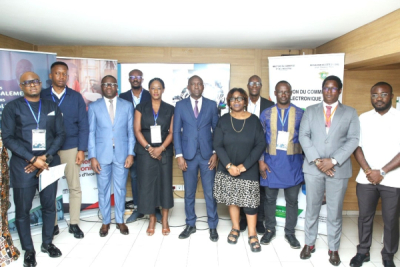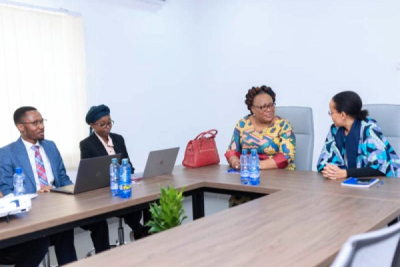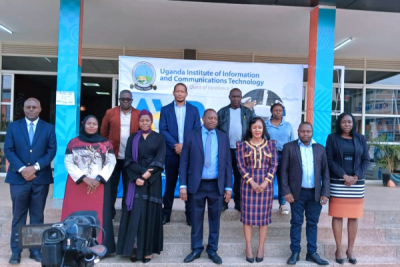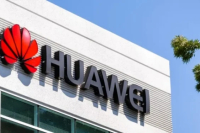
Public Management (481)
South African lawmakers have completed digital economy courses to gain a better understanding of technology. Now, local officials are set to receive similar training.
South Africa's Minister of Communications and Digital Technologies Solly Malatsi on Tuesday launched the Broadband and Digital Skills Program, aimed at equipping municipal leaders and councilors with skills to leverage digital innovations, improve service delivery and enhance public engagement.
According to Malatsi, public representatives, particularly councilors, are often overwhelmed by numerous service requests and critical decisions they must make daily. Acquiring digital skills enables them to work more efficiently and respond more swiftly to public inquiries, making them more accessible to citizens.
The initiative, implemented in partnership with the British Embassy and the South African Local Government Association (SALGA), comes amid the rapid acceleration of digital transformation. It is part of the South African government's national strategy on digital and future skills. According to the strategy, acquiring digital skills is expected to create new jobs, significantly improve quality of life, education, and drive economic growth.
"In recognition of the fact that trends and advances in information and communications technology are ever evolving, we are committed to developing these competencies to realise our mission to digitally skill, upskill, and reskill the population," Malatsi said.
Adoni Conrad Quenum
The Mauritian government has rolled out several ambitious programs to boost the country's digital transformation. Early results are promising, with modern infrastructure and digital public services becoming a reality.
Mauritius launched its Mobil ID, a digital identity card, on Thursday, marking a significant milestone in its digital transition.
The event, presided over by Technology Minister Deepak Balgobin, also showcased the Mobile Wallet Application (MWA), the tool through which the digital ID can be obtained.
Balgobin said the Mobil ID is more than a technological innovation; it represents a decisive government commitment to modernizing the nation. "Mauritius stands out as the first African country to adopt a digital identity card that meets international ISO standards. This technological advancement positions our country at the forefront, reinforcing our role as a leader in this new digital era," he stated.
The Mobil ID is the result of a collaboration between Thales and Harel Mallac Technologies. It is a key component of the "Digital Mauritius 2030" strategy, which aims to make digitalization one of the main pillars of the Mauritian economy. This ambitious strategy includes significant investments in digital infrastructure, digital skills training, and transforming public administration into a fully digital model. Supporting this initiative, Mauritius Telecom (MT) expanded its 5G network nationwide as early as June.
According to DataReportal figures published at the beginning of 2024, Mauritius had approximately 982,500 Internet users out of a population of 1.3 million, reflecting the population's growing embrace of the digital age.
The Mobil ID stands out for its advanced features, allowing citizens to report a change of address or declare the loss of their physical identity card. It also facilitates the electronic signing of official documents. To ensure user security, the Mobil ID incorporates two verification systems and dual authentication, providing effective protection against identity theft.
Samira Njoya
E-commerce in Côte d'Ivoire has seen a surge in recent years, with a marked increase in online retail sites and sales volume.
Key players in Côte d'Ivoire's e-commerce sector gathered in Abidjan on Wednesday and Thursday to discuss the future of the industry. The market, valued at over XOF280 billion (€421.6 million) in 2023, is expected to see a compound annual growth rate of 11.3% through 2027, according to figures presented at the strategic workshop.
The workshop, initiated by the Ministry of Commerce and Industry in collaboration with the consulting firm Marabu, focused on promoting a national strategic vision for e-commerce development. The goal is to cultivate a competitive, inclusive, and sustainable digital ecosystem.
"We aim to position Côte d'Ivoire as a regional hub in this rapidly expanding sector. We are here to collaborate, exchange ideas, and develop initiatives that will foster a competitive, inclusive, and sustainable digital ecosystem," stated Sylla Kalilou, Director General of External Trade, who represented Minister of Commerce and Industry Souleymane Diarrassouba.
Like many African nations, consumers in Côte d'Ivoire are increasingly attracted to online shopping, driven by both local and international e-commerce platforms like Jumia, Afrimarket, and Africashop, which provide a diverse array of products and services. However, despite this rapid growth, the Ivorian e-commerce market remains largely underdeveloped, with many startups facing challenges in establishing themselves.
Through this initiative, the government aims to facilitate dialogue among stakeholders in the sector to enhance e-commerce in Côte d'Ivoire. The initiative also seeks to communicate ongoing reforms, which include drafting and validating a new e-commerce law, implementing a national e-commerce strategy, creating a strategic action plan through 2028, and developing regulations for a public-private consultation framework.
Samira Njoya
Launched in June 2022 by Osita Oparaugo, the Nigerian edtech GetBundi provides access to educational content in science, technology, engineering, and mathematics (STEM) and digital skills.
On Thursday, August 29, the Nigerian edtech startup GetBundi announced the signing of a memorandum of understanding (MoU) with the National Commission for Colleges of Education (NCCE). The initiative, titled "Empowering Tomorrow’s Teachers," aims to equip both students and teachers with essential digital skills.
“This initiative is not just about filling gaps in numbers but also about enhancing the quality and attractiveness of the teaching profession by equipping our future teachers with 21st-century digital skills. In today’s rapidly evolving educational landscape, our teachers must be well-versed in digital tools and technologies that enhance learning outcomes,” said Paulinus Chijioke Okwelle, Executive Secretary of the NCCE.
The program comes at a time when digital transformation is accelerating across the continent. Nigerian authorities are increasingly launching initiatives to train the population in digital skills. In August 2023, the government partnered with American tech giant Google, which plans to invest $1.5 million to train 20,000 youths in digital literacy. Later, the American Business Council (ABC) and Microsoft also committed to similar efforts.
These initiatives align with the digital agenda of President Bola Tinubu’s administration, unveiled in May 2023. Nigeria is a leading tech hub in Africa, with one of the most attractive startup ecosystems on the continent. Nigerian startups secured $469 million in 2023, representing 20.39% of the total funding raised by African startups, according to Partech Africa.
However, the country still faces significant challenges in the sector. According to the International Telecommunication Union, Nigeria ranks 26th in Africa with an ICT development index of 46.9 out of 100 in 2024, trailing far behind the top three—Libya (88.1), Morocco (86.8), and Seychelles (84.7).
Adoni Conrad Quenum
Fake diplomas are becoming increasingly prevalent in Africa. To address this issue, governments are turning to digital solutions that offer effective and long-lasting solutions.
The Democratic Republic of Congo (DRC) plans to launch a digital system to combat fake diplomas and certificates, education officials said on Thursday. National Education Minister Raissa Malu and Higher Education Minister Mukuna Marie Therese announced the initiative after a joint meeting. The system, called "Optsolution," will verify state diplomas and certificates in real time.
"Graduates applying to university will only need a 14-digit code. The Higher Education Ministry's system will then access the National Education database for applicant information," said Rodrigue Iyembo, a National Education Ministry expert.
DRC's system aims to cut verification times from 4-5 months to instant checks. Future plans include extending the platform to private sector diplomas.
The platform is part of DRC's National Digital Plan, aiming to digitize key sectors by 2025, with education as a priority.
This move comes as African countries struggle with a rise in fake diplomas. Ethiopia, after finding nearly 1,000 counterfeit certificates among 18,000 reviewed in 2023, contracted Swiss firm SICPA to certify diplomas using blockchain and QR codes.
Samira Njoya
Despite facing challenges, African nations are investing more in Information and Communication Technologies (ICT) across different industries. In the field of education, Uganda is aiming to make significant advancements.
Ugandan authorities on Friday inaugurated the steering committee for an Augmented Virtual Reality (AVR) project at the Uganda Information Communication Technology (UICT) university. The project aims to introduce AVR into classrooms.
Fredrick E. Kitoogo, UICT's director, announced that “1,267 staff and students from UICT have been enrolled on the AVR platform, with 1,370 total logins recorded. 5000 educator licenses with 1267 already issued to UICT staff and students; and 750 enterprise licenses are yet to be distributed.”
The project is part of the Ugandan government's broader efforts to improve education quality through the use of new technologies. Authorities believe that virtual reality and augmented reality can create immersive and interactive learning environments, enhancing student engagement and motivation.
Uganda has also allowed smartphones, tablets, and computers in schools. “We are mindful of the fact that IT devices are expensive. So government has come up with projects like furnishing school computer labs. With time, government is coming up with measures to ensure that the cost of these devices is brought down so that they are as affordable as possible,” said Aminah Zawedde, Permanent Secretary of the Ministry of ICT.
Adoni Conrad Quenum
In 2023, Ethiopia launched a new artificial intelligence policy. To fully leverage the potential of this technology, the country is seeking strategic partnerships.
A delegation of Russian artificial intelligence (AI) experts, headed by Russia's Ambassador to Ethiopia, Evgeny Terekhin, visited the Ethiopian Artificial Intelligence Institute on Wednesday, August 21. They were welcomed by Taye Girma, the Institute's Deputy Director General.
The visit is part of the two countries' growing cooperation in the technology sector. As generative AI and large language models continue to advance, AI has become a key area of focus for their partnership.
Ethiopia adopted its national AI policy in July 2023. The policy outlines the country's strategy for leveraging AI to drive development, covering areas such as data management, human capital development, research and development, infrastructure, legal and ethical considerations, and international cooperation.
A partnership with Russia in AI could offer Ethiopia several benefits. It could facilitate technology and skills transfers, help develop AI applications tailored to local needs, and attract Russian investment in Ethiopia's tech sector, boosting innovation and job creation. For Russian companies, the cooperation could provide an opportunity to expand their influence in the AI domain in Africa.
Adoni Conrad Quenum
With the multiplication of digital transformation across Africa, cybersecurity has become a top priority for countries across the continent. To protect themselves and their institutions from potential threats, they are taking steps to strengthen their cyber defense.
Chinese tech company Huawei launched a cybersecurity training program for Zimbabwean government officials in Harare on Monday, aiming to strengthen their defenses against online threats.
The four-day course brings together 100 officials from various ministries. The curriculum covers global cybersecurity trends and data security governance.
"Huawei takes cybersecurity seriously, and we have made it a top priority in all of our operations and product development. Huawei invests heavily in research and development to ensure our technologies are secure and resilient against evolving cyber threats," said Yang Shengwan, managing director of Huawei Zimbabwe.
This initiative comes as digital transformation accelerates across Africa. Zimbabwe ranked 24th with a score of 47.7 out of 100 in the International Telecommunication Union's (ITU) Information and Communication Technology Development Index in 2024, up from 42.7 in 2023. In the ITU's Global Cybersecurity Index, Harare placed 17th in 2020 with a score of 36.49.
Adoni Conrad Quenum
Algerian authorities want to equip the population with digital skills. One of their strategies to achieve that goal is to provide primary schools with dedicated tools.
Algeria is set to equip an additional 1,700 primary schools with digital tablets, as announced by Abdelhakim Belaabed (photo), the country's Minister of National Education, on Thursday, August 8. This announcement was made during a national conference focused on implementing the operational plan for the upcoming 2024-2025 school year in Mostaganem.
"This year, 1,700 primary schools will receive digital tablets, increasing the total number of schools equipped with such technology to 5,000 nationwide," Belaabed stated.
Since taking office in 2019, President Abdelmadjid Tebboune has prioritized digital technology as a key component of Algeria's development strategy. The COVID-19 pandemic has further accelerated the nation’s digital transformation efforts. According to the "Measuring Digital Development – ICT Development Index 2024" report released by the International Telecommunication Union in June, Algeria's ICT Development Index is 80.9 out of 100, placing it sixth in Africa.
This initiative aims to provide the population, especially primary school students, with essential digital skills. The introduction of digital tablets is expected to enhance students' digital competencies, promote inclusive education for those with special needs, and enable real-time tracking of students' progress, facilitating continuous assessment and the adaptation of teaching methods.
Adoni Conrad Quenum
In 2023, Ghana officially recorded 11,694 road accidents. To reduce that number, authorities are turning to advanced technologies.
On July 30, the Ghanaian Ministry of Roads and Highways announced the launch of a mobile application called "Maintain My Road." This app will allow citizens to report road issues, aiming to enhance road safety and infrastructure.
The pilot phase, spanning five months, targets major roads in four key cities: Accra-Tema, Kumasi, Takoradi, and Tamale. "The accessibility provided by a well-maintained road system enhances tourism by connecting visitors to key attractions, generating revenue, and creating jobs in the hospitality sector," stated Francis Asenso-Boakye, Ghana’s Minister of Roads and Highways.
Between January and October 2023, the National Road Safety Authority (NRSA) recorded 11,694 road accidents in the country. In response, authorities have implemented advanced technology using cameras and sensors to detect and penalize traffic violations such as speeding and running red lights. The launch of "Maintain My Road" is part of this broader initiative.
Additionally, a call center has been established with the same objective. It operates Monday through Friday from 8 AM to 5 PM, with customer service representatives fluent in several local languages, including Twi, Ga, and soon Hausa.
Adoni Conrad Quenum
More...
Gabon is currently one of the African leaders in the development of information and communication technologies (ICT). With the support of strategic partners, the country is undertaking the digitization of its judicial sector.
Gabon has obtained a ¥331 million (about $2.2 million) grant from Japan to modernize its judicial sector through digital technology. According to a release, dated Junly 29, from the justice ministry, the project will be carried out in partnership with the United Nations Development Programme (UNDP).
“This is a process we began with a symposium last November. The signing of this aid agreement will allow us to achieve our goals for the justice system in our country,” Justice Minister Paul-Marie Gondjout (photo, center) said.
The initiative aligns with Gabon’s “Gabon Digital” strategy, which aims to establish the country as a Central African hub for the digital economy. In June, the government approved a €56.2 million ($61 million) loan from the World Bank to finance the broader strategy.
Gabon ranked 10th among African countries with a score of 74.7 out of 100 in the 2024 ICT Development Index published in the "Measuring Digital Development: The ICT Development Index 2023" report by the International Telecommunication Union. This score improved from 72.9 in the 2023 edition of the report.
Adoni Conrad Quenum
In recent years, the Algerian government has prioritized accelerating the digitization process. To guide this transformation, the country is developing a comprehensive roadmap.
Algeria is set to implement a new digital transformation strategy, High Commissioner for Digitization Meriem Benmouloud said on Monday. The final draft was submitted to President Abdelmadjid Tebboune for approval in June.
The strategy, a first for the North African nation since independence, aims to shift from paper-based to digital management, increase transparency, reduce bureaucracy, broaden access to information, and boost economic performance while maintaining service quality.
The five-year plan, ending in 2029, is built on two pillars: a forthcoming digitization law and information and cybersecurity. The law will establish a regulatory framework for the digital sphere, streamline bureaucracy, and address technological gaps. The government will partner with the Ministry of National Defense to strengthen information and cybersecurity.
Tebboune has championed the digital transformation project as a driver of sustainable local development. Launched in 2019, the initiative has made significant progress in the past two years to overcome resource constraints, bureaucratic hurdles, and sector complexities.
Algeria's ICT development has accelerated, according to the latest International Telecommunication Union report. The country jumped 14 places in the ICT Development Index, ranking 88th out of 169 nations. Its score of 77.8 points surpassed African (47.4), Arab (74.5), and middle-income country (62) averages.
Samira Njoya
In the face of the digital revolution, African nations are ramping up initiatives to equip their populations, particularly young people, with essential digital skills. Mastering these competencies is becoming increasingly indispensable in today's world.
On Tuesday, July 23, Ethiopian Prime Minister Abiy Ahmed (photo, center) launched the "5 Million Ethiopian Coders" program. Supported by the United Arab Emirates, this initiative aims to provide digital training to 5 million young Ethiopians, including 50% women, by 2026.
The training program focuses on areas such as programming, Android app development, data science, and fundamental digital skills in artificial intelligence. It will last between 6 and 7 weeks and will culminate in certification for participants.
"Ethiopia has hope through a forward-thinking youth population. The 5 Million Ethiopian Coders Initiative we launch today is a great opportunity and I call upon everyone to encourage the youth to register for the program, gain skills, and acquire international certification," wrote Prime Minister Abiy Ahmed on X (Formerly Twitter).
This initiative is an adapted version of the "One Million Arab Coders" program conducted in Dubai and initiated at the 2017 World Economic Forum by Sheikh Mohammed Bin Rashid Al Maktoum, Vice President, Prime Minister, and Ruler of Dubai. The Ethiopian version of the program is part of the "Digital Ethiopia 2025" plan, aimed at leveraging digital opportunities to propel the country towards a knowledge and innovation-based economy.
With over 128 million inhabitants, a significant portion of whom are young, Ethiopia faces a digital divide that prevents its population from reaping the benefits of digital growth. In the era of the technological revolution, the country must equip this young generation with the necessary skills for future jobs.
Adoni Conrad Quenum
Information and communication technologies (ICT) are now an essential part of modern education systems. An international organization headquartered in Tunisia is backing government initiatives to further integrate ICT into schools.
The Arab League Educational, Cultural and Scientific Organization (ALECSO) announced on Friday the donation of 2,000 tablets and 20 computers to Tunisia. This initiative aims to bridge the digital divide in education by equipping students and teachers from low- and middle-income communities with internet-connected devices.
The breakdown of the donation allocates 1,500 tablets and 15 laptops to the Ministry of National Education, while the Ministry of Family, Women, Children, and the Elderly will receive 500 tablets and 5 laptops.
Mohamed El Jemni, ALECSO's Director of the ICT Department and project coordinator, reaffirmed the organization's dedication to fostering digital solidarity. He emphasized ALECSO's commitment to ensuring equal access to learning opportunities and supporting countries in navigating the current global challenges and significant digital transformations.
This donation aligns with the growing importance of information and communication technologies (ICT) in education. Stakeholders across the educational spectrum are increasingly embracing these tools to enhance the quality of learning. Tunisian authorities are also actively pursuing similar initiatives, including the implementation of a digital strategy within the Ministry of National Education.
Adoni Conrad Quenum


